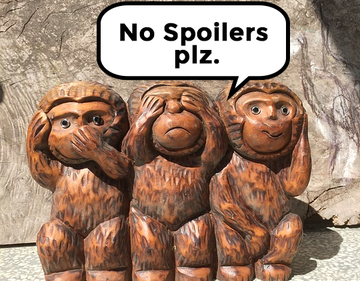Trending
Opinion: How will Project 2025 impact game developers?
The Heritage Foundation's manifesto for the possible next administration could do great harm to many, including large portions of the game development community.
In a conversation with a developer, he shared that his trailer was lacking because he didn’t want to spoil too many things. I asked if you can spoil too much? He got defensive, and I backed off. But with the internet, do spoilers really matter? NOPE.

In a conversation with a developer, he shared that his trailer was lacking gameplay because he didn’t want to spoil too many things.
“Your trailer is about a minute or two long. Can you really spoil too much?”
He got defensive. So I backed off and quickly changed topics.
I couldn’t stop thinking about it after the conversation. In an age where Let’s Play, Twitch, and communities that spread news like wildfire – do spoilers matter?
I’ll answer that in a second from my marketing perspective.
For now, I’m going to share a bit about spoilers.
//Note: The developer did make changes. But I wanted to write this article for any other developer who is afraid of spoiling too much.

From my anecdotal evidence, the ‘shh no spoilers’ started coming into the limelight during the early 2000s. I was told to watch Fight Club and the Sixth Sense but wasn’t told why. Youtube didn’t exist at the beginning of the 2000s, so you couldn’t watch trailers on demand to see if the movie was worth it. I relied entirely on word of mouth.
So I found the movies and watched them. Then I saw the twists. Then I enjoyed being part of the secret club of people who knew the twists. Then we talked in code around everyone who didn't see it.
And then that one we kid in school shouted, “Bruce Willis is a GHOST!” and we all hated that kid.
Movies became sacred. They became something to be experienced without outside influence. And ‘Shh No Spoilers’ was the mantra.
I love the ‘Shh No Spoilers’ people.
I recall another moment during my math class, where and friend and I were talking about Dragonball Z, and wondering what will happen in the next episode. “No spoilers!” another nerd threatened (we were all nerds btw.) This wasn’t War and Peace; this was a anime! Hero beats villain. Hero saves the world. Krillin dies somehow.
I freakin’ hate the ‘Shh No Spoilers’ people.
There have been experiments by people smarter than me. There are studies by those who say it CAN ruin the enjoyment. But then some studies say the opposite.
There is also an article that sits happily in the middle of the fence.
The conclusion: I don’t know the answer.
I told you those people are way smarter than me. (They probably have college degrees or something.)
I’m a marketer. I work with game developers to find customers that want their game. (I don’t sell ice to eskimos. Those aren’t marketers; those are scammers.)
To comment on the developer who was afraid to share ‘too much’ in their trailer because of spoilers, I disagree.
Here’s why.
We are living in an age where Let’s Play, Twitch, and communities that spread news like wildfire.
This is the same internet where, during the release of Star Wars 7, discussion threads had trolls ruining the middle of the movie and the defenders who downvoted them to oblivion.
Spoilers will find a way.

From a user perspective, spoilers can ruin the experience. But spoilers provide motivation as well.
Imagine a friend ruins the surprise in Bioshock Infinite, but you still check out the game. While playing, the pieces start to add up. The friend’s spoiler begin echoing in your head. Suddenly - the surprised happen. You toss your chair and shout, “I KNEW IT. THEY RUINED IT FOR ME! RAAAGH!”
But then something interesting happens.
You sit back down and continue playing.
From a marketer’s perspective, that’s a win!
Imagine the same scenario, only that friend never even told you about Bioshock Infinite. You might have never played! You might have continued living your life, blissfully unaware of Bioshock Infinite’s spoiler.
The spoiler became a subconscious motivation for you to see if your friend was right.
Now, you’re probably rolling your eyes. “Bioshock Infinite was marketed everywhere! It had an all-star team, was a press favorite, and the other Bioshocks were awesome!”
My counterpoint: How many indie games WEREN’T talked about? All because developers hid elements because they were afraid of spoiling it?
The developer with the trailer, he didn’t want to show certain elements of the game because ‘it was a spoiler.’
But from my perspective, it looked like a natural part of the game.
//He later agreed with me.
What if your 'spoiler' is actually your unique selling proposition?
That Dragon, Cancer, a game/true-story of a husband game developer and his wife dealing with their baby who dies from an illness, could have easily kept the death as a big reveal in the game.
A movie HAS to have a comprehensive story, which could include shock, fear, surprise, and a twist.
And while that feeling of surprise is a powerful emotion, it isn’t a big thing. Games can still be good, even with a terrible story. (cough almost every FPSes out there)
For the indie developers out there - don’t let the fear of spoilers hold you back from putting your best in your trailers.
If you're making a narrative game - sure. There's a fine line.
But for everyone else: you’re not holding back a surprise; you are taking your secret to the grave.
Read more about:
BlogsYou May Also Like